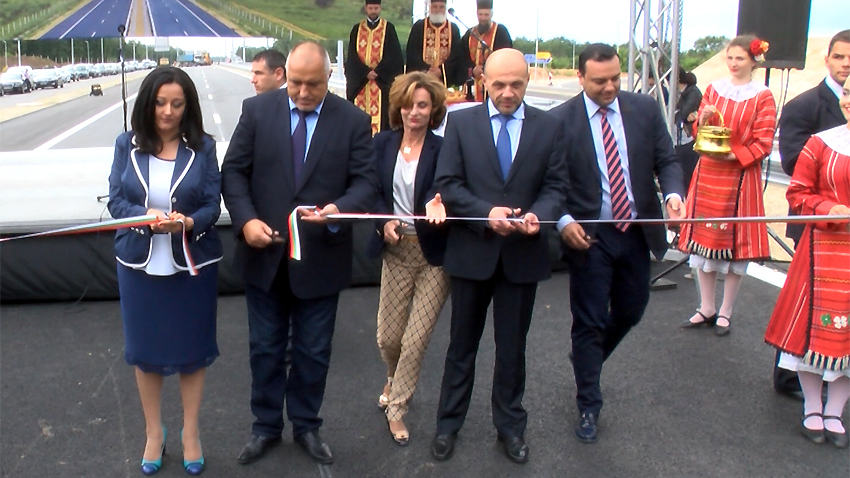North-western Bulgaria is the poorest region in the EU - its road network is underdeveloped, unlike that in southern Bulgaria. Many attribute the prosperity of the south to the first fully-completed highway in Bulgaria, the construction of which took 42 years.
By 1990 Bulgaria had only 130 km of highways. The average speed of their construction is 5 kilometres per year while that in Croatia is about 100.
The road from Sofia to Serbia is in poor condition, with sporadic repairs going on and it does not look at all like a major link between Western Europe and the Balkans. Lubomir Pozharliev from the German University of Giessen (Justus-Liebig-Universität Gießen) has studied the infrastructure in former Yugoslavia and Bulgaria until the changes in 1989. According to him, the reason behind the lack of a highway linking Serbia and Bulgaria was political. After the political rift between Tito and Stalin in 1948, in which Bulgaria backed the position of Moscow, the policy of hostility between Sofia and Belgrade affected the development of infrastructure. So, the shortest route between Belgrade and Istanbul, which passes through Sofia, remains unfinished to this day.
"Infrastructure is a political tool and is not much different than legislative or political decisions," Lubomir Pozharliev says. „When you build a road you either link or isolate people. That is how the priorities and sectors of the economy become visible. Moreover, there are various types of transportation, which means governments set priorities in the same way they write laws. "

Recently Bulgaria has announced the construction of new highways is priority. The result, however, is more than modest: in addition to the link between Sofia and Burgas and the route from Plovdiv to the Turkish border, Bulgaria has some partially-built motorways in northern Bulgaria and towards our southern neighbour Greece. "Transport infrastructure did not have much priority in the times of socialism,” Lubomir Pozharliev says and adds:
"The momentum continues. Mobility was not important and was even to be prevented. The communist regime in its paranoia avoided providing mobility to its citizens, either by creating better roads, improving railway transport or by investing in distant regions of the country. Furthermore, Bulgaria is one of few former socialist countries that did not have own automobile production (with short-lived exceptions), which is a clear sign that there was no interest in personal and private mobility of the population. For more than 50 years Bulgarians have been deprived of good infrastructure and mobility and the reasons are purely political.”
Politburo of the Central Committee of the Bulgarian Communist Party took the decision to build three highways in 1963 and 11 years later, work on the northern "Hemus," southern "Trakia" and coastal "Black Sea" motorways started.
Why is today’s Prime Minister of Bulgaria so proud of the construction of new roads?
"I find this to be a very smart move, also in terms of media presentation," Lubomir Pozharliev says. "Highways are a very powerful image and capture our imagination: a huge road is created and you can drive your own car on it. The highway is a powerful tool for attracting supporters and voters. It is curious how these images affect us in a powerful way.”
In his study Lubomir Pozharliev found out that highways in Bulgaria were conceived as roads that were to be used only by Bulgarians. Although the country used to be a tourist destination even in the years before the democratic changes, highways were not planned to serve tourist flows. Moreover, this way of thinking is still seen in the plans of today's leaders with one small exception – the "Struma" motorway, which as part of a European transport corridor would someday link the Danube River with Thessaloniki. Currently, just 150 kilometres of the route are part of a motorway.
"Our plans are not very far-sighted, because we continue to think in internal categories,” Lubomir Pozharliev says. "The highways clearly show the country’s geopolitical orientation. The case with the finished Maritsa highway leading to neighbouring Turkey is interesting. The reasons are probably economic because of the large number of goods traded between the two countries. But on the other hand it is rather surprising, because Bulgaria has always wanted to be closer to the West, not the East. "
English: Alexander Markov
Convulsions Before Multipolarity — a Time When Illusions Are Sacred and Truth Is Heresy is the title of a new book that will be officially presented in early November in Sofia. It explores the agony of a unipolar world, an era of geopolitical..
Movement for Rights and Freedoms - New Beginning Leader Delyan Peevski spoke with Prime Minister Rosen Zhelyazkov on Monday, the party's press centre reported. "I reaffirmed my position of full support for the government as long as it works for the..
EU roaming fees to be eliminated for Albania and Montenegro Roaming charges between Albania and the EU will be completely eliminated in 2026, European Commission President Ursula von der Leyen said during her visit to..

+359 2 9336 661
